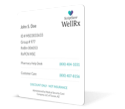What Is the Best Medication for Dementia?
By Jillian Foglesong Stabile MD, FAAFP, DABOM
October 7, 2025

What Is the Best Medication for Dementia?
If you or a loved one is experiencing memory problems, you may be wondering: What is the best medication for dementia? Several memory drugs can benefit patients with dementia, especially those with dementia due to Alzheimer's, Lewy Body, or Parkinson's disease. For people with frontal-temporal dementia or vascular dementia, options may be more limited when it comes to prescription medication for memory loss. There is no one best medication for all dementia patients, but we'll discuss a few common dementia medications in this guide.
What is the best medication for dementia? Common dementia medication list
Not all medicines used to treat dementia are specifically for the memory problems. Several common medications are specifically indicated to treat dementia, including:
| Medicine | Drug Class | Standard Dosage (Adults) | Well Rx Savings Card |
| Memantine | NMDA Receptor Agonist | 5–10 mg twice daily 7, 14, 21, 28 mg daily (extended release) | Well Rx |
| Donepezil | Cholinesterase inhibitor | 5–10 mg daily | Well Rx |
| Galantamine | Cholinesterase inhibitor | 4–12 mg twice daily 8–24 mg daily (extended release) | Well Rx |
| Rivastigmine | Cholinesterase inhibitor | 1.5–6 mg twice daily | Well Rx |
| Benzgalantamine | Cholinesterase inhibitor | 5–15 mg twice a day | Well Rx |
These medications are specifically indicated to treat patients with Alzheimer's disease, Lewy body dementia, and dementia from Parkinson's disease. Other medications may help alleviate some of the symptoms that dementia patients experience.
Are there medications for dementia?
Are there medications for dementia? The answer is yes; there are several common medications for dementia. Some anti-dementia drugs target memory loss and attempt to slow the progression of the disease. Other medicines for dementia patients may target the underlying cause. For example, medications to control cholesterol in patients with vascular dementia. Some medicines may also be used to treat symptoms that are common in dementia, such as depression or behavioral issues.
Who needs prescription medication for memory loss?
For many types of memory loss, the earlier the medication is started, the better. Unfortunately, even the best medicine for dementia doesn't cure the disease. Prescription memory medication can slow the progression of the disease, but it cannot cure or reverse it. Other medications that are often used in people who have dementia include antidepressants, antipsychotics for behavioral concerns, and cholesterol-lowering drugs in people who have high cholesterol or vascular dementia.
Types of dementia meds
There are two primary types of dementia meds.
NMDA receptor agonists
N-methyl-D-aspartate receptors are found throughout the brain and central nervous system. They are responsible for transmitting signals and plasticity, which is the brain's ability to adapt and develop new connections. These receptors play a role in learning and memory. There is currently 1 NMDA receptor agonist used to treat dementia. Memantine is available in both short and long-acting forms. This medication activates the NDMA receptors and protects the brain from damage and toxicity. Memantine is often used in combination with the other class of prescribed drugs for dementia. Common side effects of this medication include dizziness, headache, confusion, diarrhea, and constipation. Confusion, aggression, high blood pressure, hallucinations, vomiting, incontinence, and abdominal pain are also possible.
Cholinesterase inhibitors
Cholinesterase inhibitors are the other class of dementia meds. These medications work by decreasing the breakdown of acetylcholine in the brain. Acetylcholine is an important chemical messenger for memory, judgment, and language, among other skills. These medications have several potential uses, including being prescribed for memory loss. There are cholinesterase inhibitors used for dementia. Benzgalantamine and galantamine are approved for mild-to-moderate dementia due to Alzheimer's dementia, while donepezil is approved for mild-to-severe Alzheimer's dementia. Rivastigmine is approved for mild-to-moderate dementia due to Alzheimer's or Parkinson's disease. Side effects of cholinesterase inhibitors include increased secretions, such as tearing and excessive saliva, diarrhea, low blood pressure, and a slow heart rate. In high doses, these medications can cause toxicity, including increased urination, salivation, lacrimation, rapid breathing, upset stomach, and vomiting.
Other medications for dementia
As mentioned, several medications can help with non-memory-related dementia symptoms. Depression can mimic the symptoms of dementia, especially in people over 65 years old. Additionally, depression is common in people with dementia. Treating depression may help improve memory, and antidepressants are a commonly prescribed medicine for dementia patients. Many people with dementia struggle with their sleep. Disrupted sleep patterns may also be treated with medication. It is essential to consult with a healthcare professional before considering medication to help with sleep, as many medications used for sleep carry an increased risk of side effects or injury in people over 65. Some people with dementia have outbursts or behavioral concerns. Several medications are often used to help control these behaviors and keep people with dementia and their caregivers safer. Atypical antipsychotics are one class of drugs used to treat behavioral concerns in dementia patients. It is important to note that these medications are used off-label and are not explicitly approved for behavioral problems in dementia patients. The exception to the off-label use is brexpiprazole, which is approved for the treatment of agitation in people with Alzheimer's dementia. These medications are also associated with an increased risk of serious health effects and even death in dementia patients, so they should only be taken after careful consideration and discussion with a healthcare provider.
Are the meds for memory loss available over the counter?
There are numerous over-the-counter (OTC) medications and supplements available for the treatment of memory loss. According to a 2023 review in CNS Drugs, there are 18 common ingredients in OTC products marketed for memory loss. Information on the benefits of these ingredients is limited, and more research is needed. However, the review found: Insufficient compelling evidence to recommend the following as memory aids:
- Apoaequorin
- Coenzyme Q10
- Coffee extracts
- L-theanine
- Omega-3 fatty acids
- B vitamins including B6, B9, and B12
There was limited evidence that suggested the following may have some benefit for memory:
- Ashwagandha
- Choline
- Curcumin
- Ginger
- Lion's Mane (mushroom)
- Polyphenols
- Phosphatidylserine
- Turmeric
The studies for the following supplements were mixed in their evidence of potential benefit for memory:
- Ginko biloba
- Carnitine
- Huperzine A
- Vitamin D
- Vitamin E
Vitamins and supplements are not regulated by the Food and Drug Administration (FDA), and some vitamins and supplements can interact with other medications or medical conditions. It is essential to consult a healthcare provider before starting any vitamins or supplements.
How fast do meds for dementia usually take to work?
While some people taking prescription medicine for memory loss may see improvement in their memory, these medications are not a cure for dementia. Prescription memory medication primarily slows the progression of dementia. These medications may take between three weeks and three months to take effect. Many of these medications have a range of doses, so your healthcare provider will help determine when the medication should be adjusted.
How to take memory drugs
Most dementia pills are taken once or twice a day. Taking cholinesterase inhibitors with food may decrease the side effects. NDMA receptor agonists, however, may be taken with or without food. All prescription medication for memory loss, or any other condition, should be taken in the manner recommended by the healthcare provider and pharmacist.
Home remedies for dementia
While there is no cure for dementia, and no home remedies to treat the memory loss, you can take actions for yourself or your loved one with dementia:
- Care for the Caregiver: You can't care for your loved one without caring for yourself first
- Keep the environment calm and familiar when possible: Surround your loved one with a calm environment and familiar objects
- Consider locks and alarms for security: Door and window alarms can help prevent wandering. Keep dangerous objects out of reach
- Minimize fall risks: Remove throw rugs, cords, and other trip hazards and consider adding grab bars in the bathroom
- Promote regular exercise: Regular activity that is appropriate for mobility and strength
- Maintain adequate sleep: People with dementia are more prone to sleep disturbances, and researchers have discovered that getting too little sleep may increase the risk of developing dementia.
- Watch out for choking hazards: As dementia progresses, many people experience difficulties with chewing and swallowing. Consider seeing speech therapy for recommendations on staying safe while eating
- Stay mentally active: Regular brain exercises such as puzzles, reading, learning a new language, playing an instrument, and other brain-challenging exercises can delay the onset of dementia and improve quality of life
- Stay socially engaged: Maintaining a strong social network stimulates the mind, can help prevent depression, and avoid isolation.
- See your healthcare professional regularly and stay up to date on preventative care
Get your free ScriptSave® WellRx account and start saving on your medications
Medications are expensive. If your healthcare provider has diagnosed you with dementia or any other health condition, you may be wondering how to save money on your medications. Consider visiting us at WellRx.com. Some people save a little. Some people save a lot. Prices vary across zip codes. Even pharmacies across the street from each other can have huge price differences. Our goal is to bring transparency to prescription medication pricing, enabling consumers to keep more money in their pockets. ScriptSave has been helping consumers save on their prescriptions for 25 years.
Best memory medications: FAQs
What are the 3 most commonly prescribed drugs for dementia?
According to the Alzheimer's Society, donepezil is the most commonly prescribed drug for dementia. Rivastigmine is prescribed when someone doesn't tolerate donepezil. Memantine is the next most common drug; galantamine is not prescribed very often.
What is the best prescription medication for memory loss?
It's hard to say what the best medication for dementia or any condition, for that matter, is because the best medication depends on the individual's health needs and circumstances. Donepezil is often the first medication used and can be combined with memantine in cases of moderate to severe Alzheimer's disease.
What stage of dementia is memantine used for?
Memantine is approved for moderate-to-severe Alzheimer's dementia. It is sometimes used off-label for mild-to-moderate Alzheimer's dementia, other types of dementia, and some other cases, such as people undergoing whole brain radiation therapy.
Can memantine make dementia worse?
Memantine does not make dementia worse, but occasionally it can cause side effects. Dementia is a progressive disease, and memantine may not work for everyone.
What are the best dementia pills?
The best dementia pill is one that is well tolerated and effective for the person taking it. Each person is different, so there is no one best dementia medication for all patients.
What are the best medications for early dementia?
All three of the cholinesterase inhibitors, donepezil, rivastigmine, and galantamine, are approved for use in mild-to-moderate dementia.
How does donepezil work?
Donepezil is a cholinesterase inhibitor. This class works by preventing the breakdown of acetylcholine. Acetylcholine is vital in transmitting signals in the brain.
Who should not take medicines for dementia?
There are some medications, such as medications that suppress the immune system, that should not be used with dementia medications. Additionally, people who misuse drugs or alcohol, have recently had certain types of cancer, or who have had a recent heart attack or stroke should not use medicines for dementia. The healthcare team must be aware of all the patient's medical conditions to provide them with the best advice about medication use.
What therapies other than common medications help dementia patients?
Staying physically active and engaging the mind are effective ways to support individuals with dementia. A calm, familiar environment is also helpful.
Is it worth taking medication for dementia patients?
The decision about whether or not to take medication is an individual decision based on risks and benefits. Since the medicines are not a cure for dementia and can only slow the progression of the disease, the earlier in the course of the disease that medication is started, the better.
What is the number one food that fights dementia?
There is no single food that can prevent or cure dementia. Generally, a healthy, well-rounded diet with nutrient-dense, anti-inflammatory foods is beneficial. Some examples of diets that can be beneficial for brain health include the Mediterranean Diet and the MIND diet.
What happens if you don't take any anti-dementia drugs?
If you or your loved one chooses not to take any dementia meds, that's okay. Because the medications primarily work to slow down the progression of the disease, it may progress more quickly than it might have otherwise. But the course of dementia is different for every individual, so it's hard to say how it will impact each person. Missing a dose or discontinuing meds for dementia may cause increased problems with memory or thinking in the short term, but doesn't necessarily make the course of the disease worse.
References
https://www.nhs.uk/conditions/dementia/about-dementia/treatment
https://www.definitivehc.com/resources/healthcare-insights/most-common-dementia-medications
https://www.webmd.com/alzheimers/dementia-treatments-overview
https://www.mayoclinic.org/diseases-conditions/dementia/diagnosis-treatment/drc-20352019
https://my.clevelandclinic.org/health/diseases/9170-dementia
https://pmc.ncbi.nlm.nih.gov/articles/PMC7462122/
https://www.alzheimers.org.uk/about-dementia/treatments/dementia-medication/general-info
https://memory.ucsf.edu/treatments-stays/medications-dementia
https://pubmed.ncbi.nlm.nih.gov/21955192/
https://www.drugs.com/memantine.html
https://www.nhs.uk/medicines/donepezil/how-and-when-to-take-donepezil
https://www.mayoclinic.org/drugs-supplements/galantamine-oral-route/description/drg-20067458
https://pmc.ncbi.nlm.nih.gov/articles/PMC6375899/
https://pmc.ncbi.nlm.nih.gov/articles/PMC7288647/
https://www.health.harvard.edu/mind-and-mood/is-it-dementia-or-depression
https://link.springer.com/article/10.1007/s12325-022-02075-8
https://www.bmj.com/content/385/bmj-2023-076268
https://jamanetwork.com/journals/jamaneurology/fullarticle/2811629
https://www.mayoclinic.org/diseases-conditions/alzheimers-disease/in-depth/alzheimers/art-20048103
https://www.nia.nih.gov/health/alzheimers-caregiving/getting-help-alzheimers-caregiving
https://alzheimer.ca/en/help-support/im-living-dementia/living-well-dementia/challenging-your-brain
https://www.health.harvard.edu/blog/what-to-eat-to-reduce-your-risk-of-alzheimers-disease-2020050819774
https://www.sciencedirect.com/science/article/abs/pii/S1552526015000175
Recommended Articles









